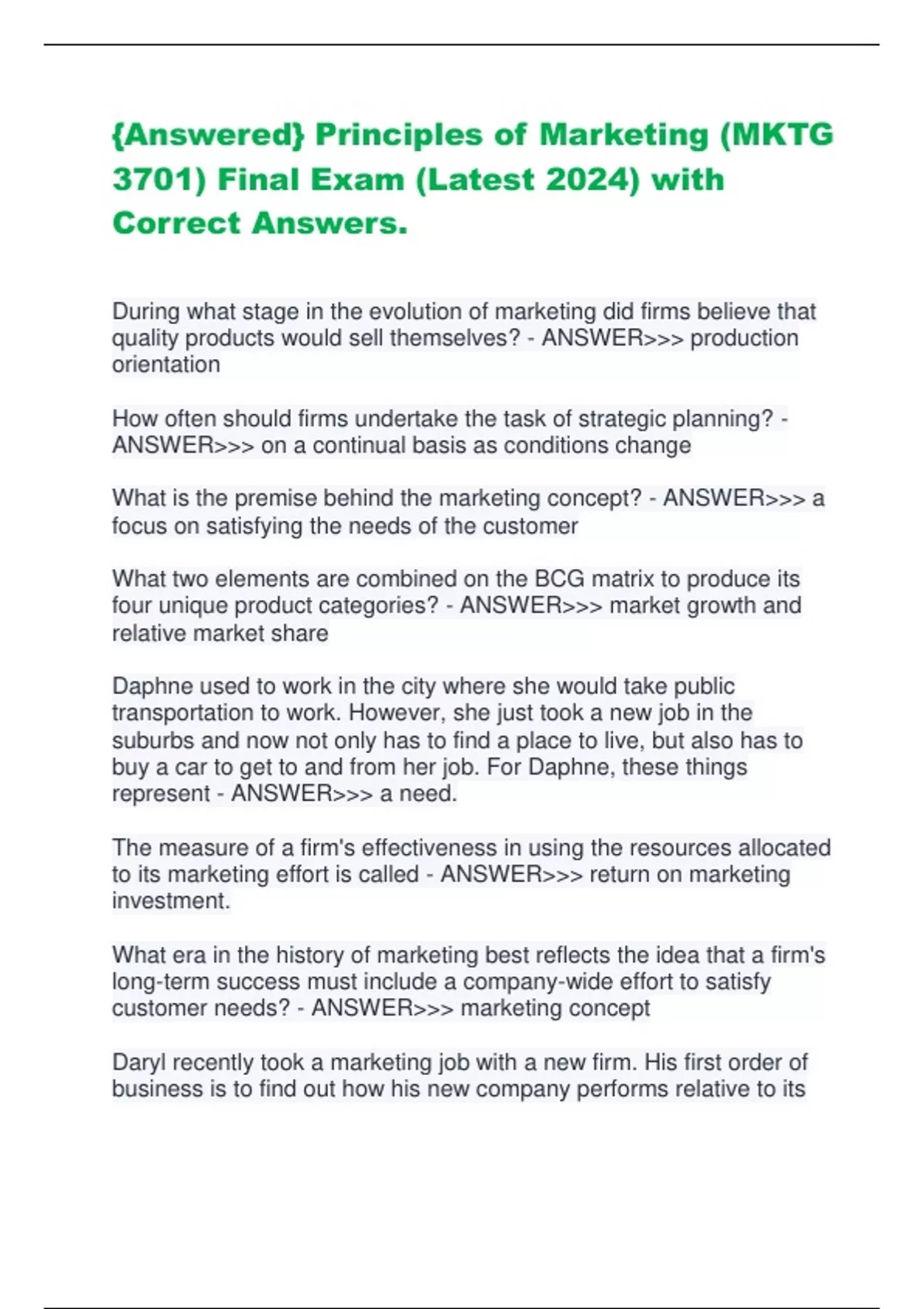The marketing concept stage centers on satisfying customer needs to achieve business success. This stage involves focusing on customer preferences and creating products or services to meet those needs effectively.
As marketing evolved, businesses realized the importance of understanding and catering to customer demands. The marketing concept stage emphasizes customer orientation and building long-term relationships by providing value and satisfaction. By embracing this approach, companies can establish a strong market presence and gain a competitive edge.
This evolution in marketing signifies a shift towards customer-centric strategies and a deeper understanding of consumer behavior to drive business growth and success.

Credit: www.docsity.com
The Evolution Of Marketing
|
Marketing has evolved from a production-oriented approach to a customer-centric one. Initially, businesses focused on mass production without much consideration for customer needs. However, as competition intensified, the focus shifted towards selling and advertising products. This transition led to the realization that customer preferences and satisfaction should be central to business activities. The marketing concept emphasizes understanding and meeting customer needs through market research and customer engagement. This shift has transformed the way businesses identify opportunities and deliver value to consumers. |
Marketing Concept Stage
The marketing concept stage is a crucial phase in the evolution of marketing. It revolves around putting the customer at the center of all marketing activities. This means that the needs and wants of the customers are paramount in developing marketing strategies. The concept also emphasizes the importance of understanding the target market and creating products or services that satisfy their needs. It is a shift from a product-centric approach to a customer-centric one. This stage focuses on building long-term relationships with customers and delivering value to them. By adopting the marketing concept stage, businesses can gain a competitive edge by being more responsive to customer demands and preferences.
Premise Behind The Marketing Concept Stage
The marketing concept stage is based on the premise of understanding customer needs and wants. By creating and delivering value, companies aim to build long-term relationships with their customers. This stage emphasizes the importance of putting the customer at the center of all marketing activities. Understanding customer needs and wants helps businesses tailor their products and services to meet specific customer demands. By creating and delivering value, companies ensure that their offerings address customer needs effectively. Building long-term relationships focuses on nurturing customer loyalty and satisfaction over time. This approach aims to establish a strong bond between the company and its customers, fostering repeat business and positive word-of-mouth referrals.

Credit: www.stuvia.com
Strategic Shift In Marketing
The marketing concept stage marks a strategic shift in marketing. It represents a transition from product-oriented approaches to customer-oriented strategies. This evolution also involves a shift from short-term transactions to focusing on building long-term relationships. By embracing the marketing concept stage, businesses prioritize understanding and meeting the needs of their customers, ultimately aiming to create value and satisfaction. This shift signifies a move towards considering the entire customer experience, from the initial interaction to post-purchase support and engagement.
Impact Of Marketing Concept Stage
Marketing concept stage is a crucial phase in the evolution of marketing as it has a significant impact on businesses. One of the key benefits of this stage is increased customer satisfaction and loyalty. By focusing on customer needs and preferences, companies can tailor their products and services to meet their expectations, leading to greater satisfaction and loyalty.
Another advantage of the marketing concept stage is the enhancement of brand image and reputation. By prioritizing customer satisfaction, businesses can create a positive image in the minds of their target audience, which can lead to increased sales and revenue. Moreover, it helps in creating a long-lasting relationship with customers, which is essential for the growth and success of any business.
Overall, the marketing concept stage is crucial for businesses to succeed in today’s highly competitive market. By putting the customer at the heart of their operations, companies can drive growth and build a strong brand image, which can lead to long-term success.

Credit: www.sprintzeal.com
Frequently Asked Questions
What Is The Premise Of Marketing Concept?
The premise of the marketing concept is to meet customer needs and wants effectively through value-driven strategies.
What Is The Premise Behind The Marketing Concept Stage In The Evolution Of Marketing Quizlet?
The marketing concept stage in marketing evolution on Quizlet focuses on customer needs and satisfaction.
What Is The Concept Of Marketing Evolution?
The concept of marketing evolution refers to the continuous adaptation of marketing strategies to align with changing consumer behaviors and technological advancements. This involves embracing new channels, data-driven insights, and customer-centric approaches to stay relevant and competitive in the market.
What Is The Main Purpose Of The Marketing Concept?
The main purpose of the marketing concept is to meet customer needs and achieve business goals effectively.
What Is The Marketing Concept Stage?
The Marketing Concept Stage focuses on customer needs, wants, and satisfaction.
Conclusion
The marketing concept stage is pivotal in the evolution of marketing, emphasizing customer orientation and satisfaction. It represents a shift from product-centric to customer-centric approaches, fostering long-term relationships and brand loyalty. By prioritizing customer needs and preferences, businesses can adapt and thrive in dynamic market landscapes, driving success and sustainability.











